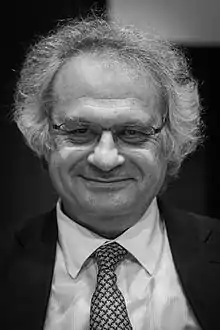Amin Maalouf
Amin Maalouf (French: [maluf]; Arabic: أمين معلوف; born 25 February 1949) is a Lebanese-born French[1] author who has lived in France since 1976.[2] Although his native language is Arabic, he writes in French, and his works have been translated into over 40 languages.
Amin Maalouf | |
|---|---|
 Amin Maalouf by Claude Truong-Ngoc, 2013 | |
| Born | 25 February 1949 Beirut, Lebanon |
| Occupation | Writer, scholar and novelist |
| Language | French |
| Notable works | Leo Africanus, The Rock of Tanios, The Crusades Through Arab Eyes, Samarkand |
Of his several works of nonfiction, The Crusades through Arab Eyes is probably the best known.[1] He received the Prix Goncourt in 1993 for his novel The Rock of Tanios, as well as the 2010 Prince of Asturias Award for Literature. He is a member of the Académie française.[3][4]
Background

Maalouf was born in Beirut, Lebanon, and grew up in the Badaro cosmopolitan neighborhood,[5] the second of four children. His parents had different cultural backgrounds. His father was from the Melkite Catholic community[6] near the village of Baskinta in Ain el Qabou. His mother, Odette Ghossein, is Lebanese of Turkish descent, from the Metn Village of Ain el Kabou. She was born in Egypt and lived there for many years before coming back to Lebanon; she currently lives in France.
Maalouf's mother was a staunch Maronite Catholic who insisted on sending him to Collège Notre Dame de Jamhour, a French Jesuit school. He studied sociology at the Francophone Université Saint-Joseph in Beirut.
He is the uncle of trumpeter Ibrahim Maalouf.[7]
Career
Maalouf worked as the director of An-Nahar, a Beirut-based daily newspaper, until the start of the Lebanese civil war in 1975, when he moved to Paris, which became his permanent home. Maalouf's first book, The Crusades Through Arab Eyes (1983), examines the period on the basis of contemporaneous Arabic sources.[3]
Along with his nonfiction work, he has written four texts for musical compositions and numerous novels.
His book Un fauteuil sur la Seine briefly recounts the lives of those who preceded him in seat #29 as a member of the Académie française.[8][4]
Awards
Maalouf has been awarded honorary doctorates by the Catholic University of Louvain (Belgium), the American University of Beirut (Lebanon), the Rovira i Virgili University (Spain), the University of Évora (Portugal), and the University of Ottawa (Canada).[2]

In 1993, Maalouf was awarded the Prix Goncourt for his novel The Rock of Tanios (French: Le rocher de Tanios), set in 19th-century Lebanon.[9][10][11] In 2004, the original, French edition of his Origins: A Memoir (Origines, 2004) won the Prix Méditerranée.[12]
In 2010 he received the Spanish Prince of Asturias Award for Literature for his work, an intense mix of suggestive language, historic affairs in a Mediterranean mosaic of languages, cultures and religions and stories of tolerance and reconciliation. He was elected a member of the Académie française on 23 June 2011 to fill seat 29, left vacant by the death of anthropologist Claude Lévi-Strauss.[4][13] Maalouf is the first person of Lebanese heritage to receive that honor.[3]
In 2016, he won the Sheikh Zayed Book Award for "Cultural Personality of the Year", the premier category with a prize of 1 million dirhams (approx. US$272,000).[14]
In 2020, he was awarded the National Order of Merit by the French government. He was given the honor by President Emmanuel Macron.[15]
Honours and decorations
| Ribbon bar | Country | Honour |
|---|---|---|
| Chevalier of the Legion of Honour | ||
| Grand officier of the National Order of Merit | ||
| Commander of the Ordre des Arts et des Lettres | ||
| Knight First class of the Order of the Lion of Finland | ||
| Grand Cordon of the National Order of the Cedar | ||
| Officier of the Order of Cultural Merit (Monaco) |
Works
Fiction
Maalouf's novels are marked by his experiences of civil war and migration. Their characters are itinerant voyagers between lands, languages, and religions and he prefers to write about "our past."
| Original | English translation | ||
|---|---|---|---|
| 1986 | Léon l'Africain | 1992 | Leo Africanus, translated by Peter Sluglett. ISBN 1-56131-022-0 |
| 1988 | Samarcande | 1994 | Samarkand, trans. Russell Harris. ISBN 1-56656-293-7. |
| 1991 | Les jardins de lumière | 1996 | The Gardens of Light, trans. Dorothy S. Blair. ISBN 1-56656-248-1. |
| 1992 | Le Premier siècle après Béatrice | 1993 | The First Century after Beatrice, trans. Dorothy S. Blair. ISBN 0-7043-7051-4. |
| 1993 | Le Rocher de Tanios[16] | 1994 | The Rock of Tanios, trans. Dorothy S. Blair ISBN 0-8076-1365-7. |
| 1996 | Les Échelles du Levant | 1996 | Ports of Call, trans. Alberto Manguel. ISBN 1-86046-890-X. |
| 2000 | Le Périple de Baldassare | 2002 | Balthasar's Odyssey, trans. Barbara Bray. ISBN 1-55970-702-X. |
Non-fiction
| Original | English translation | ||
|---|---|---|---|
| 1983 | Les Croisades vues par les Arabes | 1986 | The Crusades Through Arab Eyes. ISBN 0-8052-0898-4 |
| 1998 | Les Identités meurtrières | 2000 | In the Name of Identity: Violence and the Need to Belong, translated by Barbara Bray. ISBN 0-14-200257-7.[17] |
| 2004 | Origenes | 2008. | Origins: A Memoir, translated by Catherine Temerson. ISBN 978-0-374-22732-6.[18] |
| 2009 | Le Dérèglement du monde | 2011 | Disordered World, translated by George Miller. |
Librettos
All Maalouf's librettos have been written for the Finnish composer Kaija Saariaho.
- 2000. L'Amour de loin ('Love from Afar'), opera
- 2003. Adriana Mater, opera
- 2006. La Passion de Simone, oratorio
- 2010. Émilie, monodrama
References
- "Amin Maalouf" Archived 27 December 2012 at the Wayback Machine, Modern Arab writers.
- "About the author", with Amin Maalouf.
- "Lebanese novelist Amin Maalouf joins elite French Academy", The Daily Star, 15 June 2012.
- "Amin MAALOUF." Académie Française.
- Battah, Habib. 11 November 2012. "Amin Maalouf: a writer’s bedroom." Beirut Report.
- Esposito, Claudia (2013), "Of Chronological Others and Alternative Histories: Amin Maalouf and Fawzi Mellah", The Narrative Mediterranean: Beyond France and the Maghreb, Lexington Books, p. 36, ISBN 978-0739168226,
born into a culturally composite family - his mother was Egyptian of Turkish origin, his father a Greek Catholic in 1949 in Lebanon...
- Olivier Nuc; Valérie Sasportas (3 March 2017). "Qui est Ibrahim Maalouf trompettiste dans la tourmente?". Le Figaro.
- Un fauteuil sur la Seine : Quatre siècles d'histoire de France, Grasset, 2016 (ISBN 978-2-246-86167-6)
- Dia, Hamidou. 1995. "Amin Maalouf, écrivain libanais, Prix Goncourt 1993." Nuit Blanche (59):76–80.
- Reuters (9 November 1993). "Amin Maalouf wins top French book award." Toronto Star.
- Coppermann, Annie. 9 November 1993. "Amin Maalouf, lauréat attendu du prix Goncourt" (in French). Les Echos.
- "Prix Méditerranée". Prix.
- "Amin Maalouf entre à l'Académie française". Le Monde. 14 June 2012. Retrieved 10 October 2015.
- Ghazal, Rym (2 May 2016). "Cultural Personality of the Year Award winner Amin Maalouf: 'I prefer to write about our past'". The National.
- "Lebanese author Amin Maalouf awarded National Order of Merit in France". The National. Retrieved 2 March 2020.
- "Le palmarès" (in French). Académie Goncourt. Archived from the original on 6 November 2009. Retrieved 27 November 2009.
- Maalouf, Amin. [1998] 1998. "Deadly Identities," translated by B. Caland. Al Jadid 4(25).
- Maalouf, Amin. [2004] 2008. Origins: A Memoir, translated by C. Temerson. New York: Farrar, Straus and Giroux. ISBN 978-0-374-22732-6. Preview via Google Books.
External links
- Amin Maalouf blog
- Jaggi, Maya (16 November 2002). "Profile: A Son of the Road". The Guardian. Retrieved 29 November 2009.
